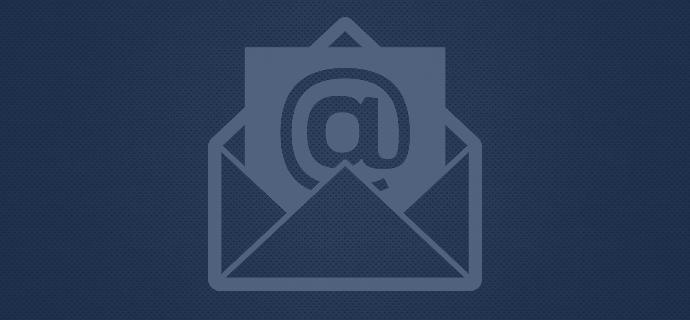I am convinced that some day we will all have a really good laugh at ourselves for ever using a form of communication as ridiculous as email. We will laugh that we ever tried to make it do the things we make it do. It is my hope that we will soon move to more efficient forms of communication.
In the meantime, though, we are stuck with email, and need to learn to use it well. I have put a lot of time and thought into the best email practices and have identified 8 dumb email mistakes you may be making (which is to say, 8 dumb email mistakes I have found myself making). Many of these mistakes apply to everyone, though some apply primarily to those of us who tend to sit at a desk most of the day.
1. You Check Email All Day
Do I own email, or does email own me?
This is the most common of all email mistakes: leaving it open all day long and checking it constantly. I do not spend my days sitting outside the house, looking longingly down the sidewalk, hoping to see the mailman come walking into sight. I do not check my mailbox every five minutes all day long, hoping to find something good there. And yet this is exactly how so many of us behave with email. We monitor our inboxes constantly, hoping we will find something there, feeling the need to respond to every email as soon as it arrives. If this describes your behavior, ask yourself this question: Do I own email, or does email own me?
The solution is simple. Set aside specific times in the day you will check email and keep it closed at all other times. Most of us can make do very well even if we check only once or twice in a day. You may need to send emails throughout the day, but determine to check email only on a schedule. Here’s a hint: If you use GMail you should be able to use this URL to compose an email without seeing your inbox.
(I acknowledge that in some job situations you are required to monitor email all day. Even there, though, consider how you can bring self-control to bear.)
2. You Use Your Best Hours To Check Email
One of the most important things you can do for personal productivity is to reserve your best hours for your most important work. For some people those are hours late in the day; for most, though, they are the first hours of the day, somewhere between the second cup of coffee and the pre-lunch stomach rumbles. Unless email is the most important thing you do, keep it closed during those peak hours. Far better, go into those hours with a plan that will help you to use them well. If your peak productivity is between eight and noon, check email before or after that time, but not during it.
3. You Use Email For High Priority Communication
Email is a helpful medium for some kinds of communication, but a very poor one for others. It is at its worst when it comes to high priority messages and notifications. When we use email for high priority communication—family emergencies, church members asking for help from pastors, and so on—we are then forced to have it open in front of us all the time or to use notifications to alert us to each new mail.
Determine not to use email as your form of communication for emergencies or other high priority contact. If you have people who need to be able to get in touch with you at a moment’s notice, have them do it via phone or in person, not through email. This is crucial if you are going to reduce your dependence upon constantly checking email.
4. You Use Email As Your To-do List
A crowbar can dig a hole, but you will get it done better and faster with a shovel.
In all of life, there is value in finding the best tool for the job. A crowbar can dig a hole, but you will get it done better and faster with a shovel. Email is a very poor tool for managing your tasks and to-do lists. Still, far too many people use email as a task management system, demanding that their inbox function as their to-do list. This has two great drawbacks: First, it uses the wrong tool for the job and, second, it requires keeping email open all the time in order to process your tasks.
It is far better to find a task management solution created for that purpose. This will allow you to identify, own and organize tasks your way. This may be a paper-based or a software solution. For Apple computers I recommend Things or Omnifocus; unfortunately I am not familiar with PC-based solutions.
5. You Compose or Reply When You Don’t Need To
Email’s ease-of-use gives us the ability to send emails that accomplish nothing beyond wasting one another’s time. Here’s a challenge: If you would not write it on a piece of paper, put it in an envelope, attach a stamp, and put it in a mailbox, you should probably not email it either. Create new emails only when you genuinely need to; reply to emails only when the email absolutely demands a reply. Do not feel the need to round out or finish off every email conversation. Never reply with “LOL!” or “Ha!” Overall, give greater significance to email by only writing important messages.
6. You Get a Notification for Every New Email
Notifications exist to pull you away from what you are doing and toward something else. As long as you receive notifications for each email you receive—whether that is a beep or a popup or something else—you will be constantly drawn away from more important and productive pursuits. If you have determined that you will not use email for high priority communication (e.g. “Get to the hospital! The baby’s coming!”) you have no need for notifications. Turn them off!
7. You Have A Million Emails In Your Inbox
We email best when we are deliberate and organized. When you get mail (as in physical mail in your mailbox) do you open half of it, ignore the rest, and then leave it all stuffed into your mailbox? Not likely. You find the bills, put them in a place where you will remember to pay them, and when you’ve paid them, you file them away. You find the letters you want to keep and put them in a safe place. You find the letters that need a reply and you reply to them. In the same way, you need to find a system for processing your email, filtering the real from the junk, the important from the insignificant, the ones that demand a reply from the ones that simply need to be archived.
Determine that every time you open your email (Just twice a day!) you will do something with every email in your inbox—you will answer it, erase it, file it, add it to your task management system, or set it aside in another folder to give a lengthier or more thoughtful reply later on. Create a system and stick to it!
8. You Use Email Instead of ________
Email is good under certain circumstances, but we try to make it do things it was never designed for. In many cases it is still far better to drive over and knock on the door, or pick up the phone and call, or even to send a text message. Email has become the junk drawer of communication, the one we use when we don’t know what else to do. Identify the circumstances in which it makes the most sense to email and identify the circumstances in which it makes absolutely no sense to email. Then determine not to misuse it.
And there you have it. Avoid these 8 email mistakes! And while we are on the subject, get rid of these 6 things.










